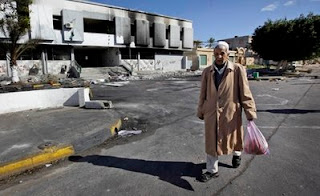 |
| AP – A man carrying a bag of food walks past a burned-out police station in Tripoli, Libya, Saturday, Feb. |
Obama: It's time for Libya's Gadhafi to go
WASHINGTON – President Barack Obama has called on Libyan dictator Moammar Gadhafi to leave power immediately, saying he has lost the legitimacy to rule with his violent crackdown on his own people.
With that shift Saturday, Obama dropped the careful condemnation, threats of consequences and the reminders to Gadhafi's regime about its responsibility to avoid violence.
The president called on Gadhafi to step down for the first time, saying the Libyan government must be held accountable for its brutal crackdown on dissenters. The administration also announced new sanctions against Libya, but that was overshadowed by the sharp demand for Gadhafi's immediate ouster.
"The president stated that when a leader's only means of staying in power is to use mass violence against his own people, he has lost the legitimacy to rule and needs to do what is right for his country by leaving now," the White House said.
The statement summarizing Obama's telephone call with German Chancellor Angela Merkel came as Libya's embattled regime passed out guns to civilian supporters and sent armed patrols around its capital to quash dissent and stave off the rebellion that now controls large parts of the North African nation.
Until Saturday, U.S. officials held back from fully and openly throwing all their support behind the protest movement, insisting that it was for the Libyan people to determine how they want to be led. The refrain echoed the public position maintained by the administration during the Egypt crisis, when the U.S. gradually dropped its support for longtime ally Hosni Mubarak but never explicitly demanded his resignation after nearly three decades in power.
Explaining the change, Secretary of State Hillary Rodham Clinton said Libyans "have made themselves clear" that they want Gadhafi out.
The tougher tone set the stage for Clinton's trip Sunday to Geneva, where she will confer with foreign policy chiefs from Russia, the European Union and other global powers on how to drive home the message to a Libyan government determined to cling to power and crush opposition to Gadhafi's rule.
Obama and Merkel strategized on how the world should respond to the violence that, according to some officials, has killed thousands of people. Clinton spoke with the EU's top diplomat Catherine Ashton to coordinate the international pressure.
Acting on its own, the administration announced a new measure Saturday when Clinton said the U.S. was revoking visas for senior Libyan officials and their immediate family members. New travel applications from these individuals will be rejected, she said.
The visa ban followed the administration's moves Friday to freeze all Libyan assets in the U.S. that belong to Gadhafi, his government and four of his children. The U.S. also closed its embassy in Libya and suspended the limited defense trade between the countries.
It is unclear how far the U.S. — and its international allies — might have to go to convince Gadhafi that his four-decade reign in Libya must end. American military action is unlikely, although the administration hasn't ruled out participation in an internationally administered protective no-fly zone.
U.N. chief Ban Ki-moon was due in Washington on Monday for talks with Obama at the White House.
A nonviolent revolt against Gadhafi's government began Feb. 15 amid a wave of uprisings in the Arab world. Most of Libya's eastern half is under the control of rebels. Witnesses say Gadhafi's government has responded by shooting at protesters in numerous cities.